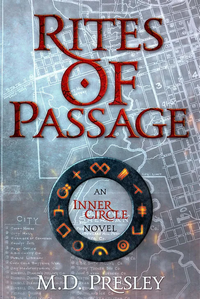Back on April 1st when this book was released, M.D. Presley stopped by to answer some questions about it, be sure to give that a read if you haven’t.
 Rites of Passage
Rites of Passage
by M.D. Presley
DETAILS: Series: The Inner Circle, #1 Publication Date: April 1, 2024 Format: eARC Length: 352 pg. Read Date: May 29-June 3, 2024

What’s Rites of Passage About?
Teenager Corbin James escapes from the cult he was (largely) raised in just as the FBI’s raid begins. Weeks, miles, and multiple states later, Corbin’s still running when he encounters someone who seems to know a lot about him. Too much for a random stranger to know.
This stranger (we later learn he’s called Mister) recruits/tricks/entices/entraps Corbin into joining him for a task. Mister and Corbin join up with some other members of the Inner Circle (a group of magicians found in most of the major cities in the U.S.) to hunt for a missing magician. Corbin has the magic ability to dowse—and for much more than water (although maybe he can find water, too, it never comes up)—he can find whoever and whatever he needs to.
Obviously, there’s something about the search for this particular missing person that is going to take a little more than one session with Corbin and his dowsing rod (or it’d be a short story, not a novel)—and Corbin’s introduction to the Inner Circle, to the reality that there are all sorts of people who can do magic, and all sorts of magic, and a world beyond his cult isn’t going to be easy for him. Or all that safe, either.
Worldbuilding, Magic System, and So On
Okay, you’d expect that someone who’s written books on worldbuilding would know what he’s doing when it comes to it (or at least, you’d hope he would). In this case, you’d be right—which doesn’t make it less impressive.
This very clearly takes place in a version of our world (joking references to “muggles” make that clear), and magic users are underground. But, as UF readers often see, that doesn’t mean that there isn’t a strong culture of rules, mores, customs, and whatnot. There are essentially two ways that magicians organize themselves—in local associations or in a major association that covers the nation (it’s hard to explain briefly—think of a regional fast food chain and McDonald’s). Due to the circumstances around this novel’s events, we get a pretty good idea—but not exhaustive—about how they both function, are organized, and recruit members.
The variety of magic abilities is pretty great. The closest comparable series I can think of on this front is Jacka’s Alex Verus books. And I know this book only scratched the surface of that. It’s one that I can’t wait to explore in future books.
When it comes to The Dresden Files, The Hollows, or The Iron Druid (for example), by the end of the first book, you have a pretty solid understanding of how magic functions in their universes (even if that understanding will grow and expand over the course of the series). With Rites of Passage, we don’t get that. But you never have the impression that Presley’s making it up as he goes along. I have a vague understanding of how my smartphone works, but I know there’s a lot that I don’t understand—but I can use it and understand that it does work. The same thing goes for the magic here—I can see these people use it, and I understand that it does work. I don’t need to know all the ins and outs.
Some authors beat you over the head with the details (I’m not suggesting that Butcher, Harrison, or Hearne did that)—showing their work like it’s a math test. Presley doesn’t do that—he just shows it working and gives you a sense that there’s a methodology afoot. The reader will slowly (over a few books) piece it together—or not, because they really don’t care about the details—as we see more. Just knowing that there’s a structure is enough.
Is It Me?
Is it just me, or are there a lot of books being written lately about people escaping from cults? I’m not talking strict religious families/cultures—but out-and-out cults. Maybe I’m not seeing as many as I think I am and it just feels that way.
I’d say I’m starting to get tired of it—and I am—but Presley does such a good job of showing how Corbin’s life and thinking have been shaped by the cult, and how even after getting away from them (and how he did it)—he still reflexively thinks like a member. Sure, he’s skeptical about some of it, and can see through some of what the leader had done. But it’s not something you can just switch off, and Presley demonstrates that with skill. So, I’ll wait until the next time I come across this phenomenon to complain about it.
The Playlist
Presley has assured readers that once he gets enough online reviews for this book, he’ll release the playlist for this book. This playlist is going to be a doozy. At some point along the way, Corbin gets his hands on an enchanted iPod that helps him navigate the events of this novel. Given his sheltered upbringing he doesn’t recognize most of the songs it plays for him—he’ll give a description of some of the songs, so the reader can guess some/many/all of what he’s listening to (depending on the reader).
Getting this playlist will actually help round out your understanding of the book (it won’t be essential, but it’ll be a nice bonus)—and I’m pretty sure it’ll be fun to listen to, too.
So, what did I think about Rites of Passage?
I’ve talked about worldbuilding already, so what about the characters, arguably the most critical component in getting me (and other readers) to want to keep reading? Presley gives his readers a lot to here. It’d be easy to create a series with almost every magician we encounter in this book as the central character—and that’s not something I can say too often. Corbin is likely the best choice—the way he has to be introduced to this world and other forms of magic is a major plus, so any info-dumping for the reader has a natural outlet in teaching Corbin. But I can see myself really getting into at least a duology with every other magic user (including the villain of the piece).
While writing this post, I went back and read one of Presley’s answers to remind myself what character he mentioned here:
In screenwriting it’s understood that supporting characters are more fun to write because they can be over the top, since they’re not carrying the show. They can be outlandish and weird because not nearly as much is riding on them, which is why they have the freedom to become fan favorites. And I have a feeling that in Rites of Passage Kirin will be this character for me.
I’d forgotten to look for Kirin as I was reading to see if I could pick that up—it’s just as well that I did, so I can say that Kirin is this fan’s favorite. I’m also a bit relieved—we didn’t definitively say goodbye to Kirin here, but the way things ended, there was no guarantee we’d see her (or many other of the surviving characters) again. But knowing she’s got an arc that will be developed over several books helps build my own anticipation for further books (nothing against Corbin, but I knew we’d get more about him).
I’m not as enthusiastic about the plot as I am the other aspects of this novel. It’s not bad by any means—I was engaged and curious throughout. It wasn’t too hard to follow or anything else negative, either. I just think there was so much going on in establishing characters, the world, the magic, the associations, and so on that there wasn’t enough space left over for the story. Your results may vary, of course—but for me everything else overshadowed the story. I do fully expect that in future installments I won’t have this complaint as Presley has established enough here that he can focus more on the plot.
Regardless, I heartily encourage Urban Fantasy readers to try this. You’re not going to find your typical UF mainstays here, but you’re going to find a world that you’re going to want to spend more time in with characters you’re going to want to get to know better. This series has the potential to become a favorite.
Disclaimer: I received this ARC from the author in exchange for this post and my honest opinion. A gamble on their part.

![]()


